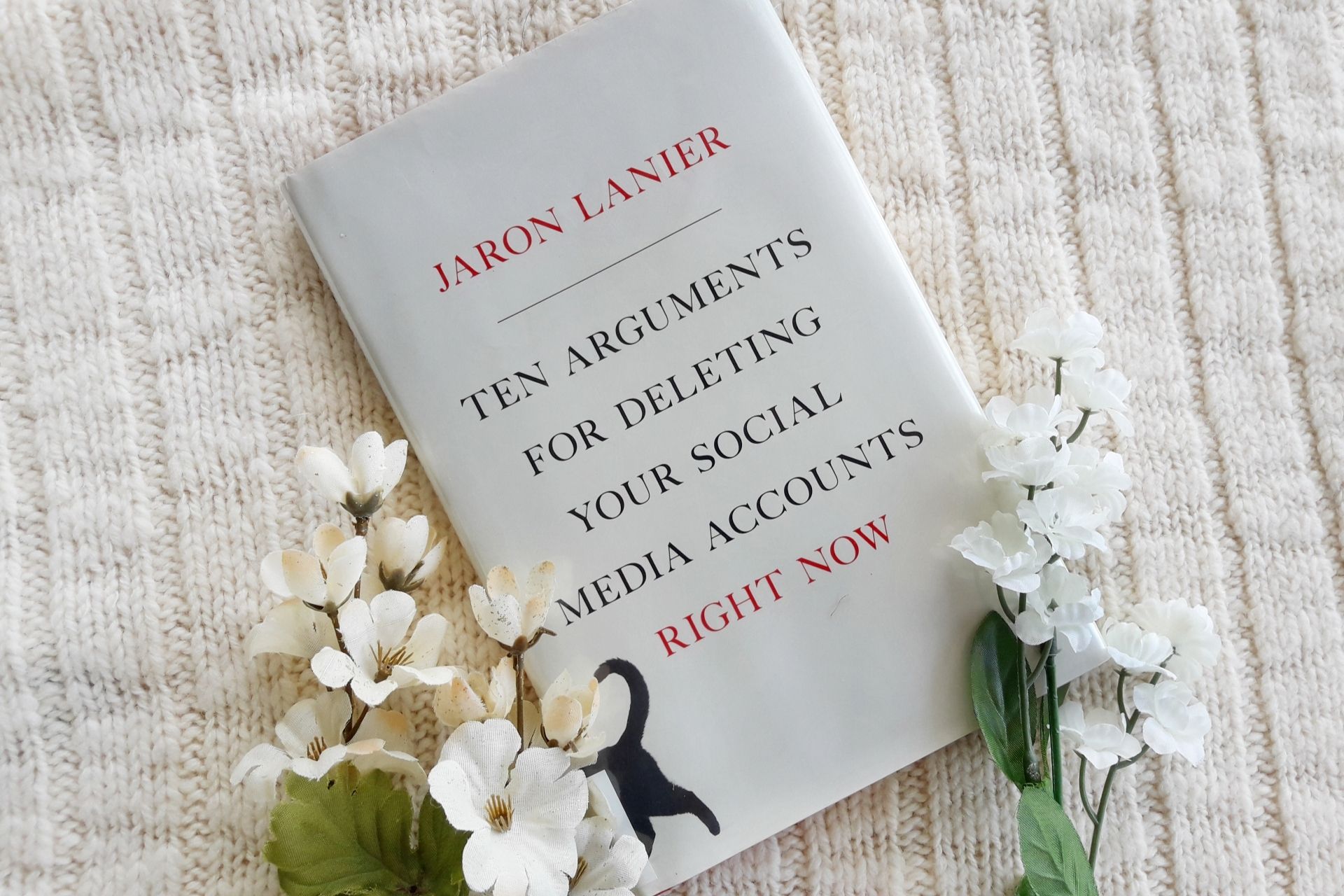
MAY 24, 2021: BLOG #27
Book Review:
Ten Arguments for Deleting Your Social Media Accounts Right Now
by Jaron Lanier
Disclaimer: The information you are about to read is based off of my own opinions. Not intended to be taken as professional advice. Not a sponsored post. Just for fun to read and to maybe open up your mind to something new. Enjoy and thanks for taking the time to read my post!
“C’mon people! Yes, being able to quit is a privilege; many genuinely can’t. But if you have the latitude to quit and don’t, you are not supporting the less fortunate; you are only reinforcing the system in which many people are trapped.”
Ten Arguments For Deleting Your Social Media Accounts Right Now by Jaron Lanier
ISBN: 978-1250196682
Page Count: 146 (slim and soulful)
Genre: social science, society, non-fiction, computers/technology
Book Bites: 3 Sentence Intro About What This Story Is
Through a presentation of ten arguments, Jaron Lanier discusses the insidious nature of one of the most commonplace aspects of our modern life: social media. With years of experience in the technology industry, he has some keen observations that challenges the innovations of his growing field but opens our eyes to how the business model of social media is creating addictions and causing more harm to humanity than good. This book is an introduction to get us aware of our habits and maybe even persuade us to drastically reduce social media activity so we can return back to the heart of what it means to be human.
*As usual, to see the official book teaser/summary of this, go to anywhere books are found and read up more about what this book is about.
Now on to My Commentary (**May Contain Spoilers: Read at Your Own Risk)
For those of you who get frustrated or exhausted thinking about the idea of reading academic research, don’t worry. This book isn’t like that. Jaron Lanier’s ability to break down academic and technical jargon and explain years of research studies in a way that reads easily for any person compelled me to hear out his argument for why social media negatively affects us.
And it’s a short book you can get through in about a day (if you’re a speed reader) or over a week or so if you read it in snippets.
I know what you’re thinking. That’s impossible! We can’t completely disconnect from social media forever. Or social media isn’t that bad. And you’re not wrong. Lanier simply presents arguments to better understand how something we spend countless hours using sometimes influences us – and for better or for worse? He, nor I, are saying you need to erase all your social media accounts, become a hermit, and go live off grid. No. But aren’t you just the slightest bit curious about what goes on behind the scenes of these very rich companies that have provided you with these apps and websites for social connection? I know I am.
My philosophy prior to reading this book was that all social media is bad. If social media was never created or if it’s completely erased from our society, then we’ll be better off. But Lanier’s book opened up my mind to seeing this issue from a different angle.
Having and using social media accounts aren’t necessarily bad in itself. What is bad, as Lanier argues, is BUMMER, which is his label for “Behaviors of Users Modified, and Made into an Empire for Rent.” Lanier argues that what is detrimental, insidious, and prevalent is the fact that social media has been used as an avenue for behavioral modification. That we, the users, are not the companies’ true customers, but the advertisers that pay the companies large sums of money are the true customers.
These tech companies then gather data from its users, plug it into algorithms which spit out personalized content back to the users. We only then really see cherry-picked ads for products or services on our feed because behind-the-scenes, data from our day’s searches, likes, history, following, etc. are constantly being collected so the system can show you targeted ads. See how this can strongly change behaviors? And see how this could increase the possibility of profits for those companies showing the ads? You’re subtly being influenced to purchase whatever they’re selling. Or to think in a certain way by showing ads that suit your ideologies.
The ten arguments are as follows: it reduces our free will, empathy, happiness and making or receiving meaningful statements, it’s making us meaner and acting like jerks to each other, undermining truth, it affects society economically and politically, it doesn’t help our soul, and reducing social media time helps combat false, over-exaggerated information and news that we see.
Duh, right? Anyone with common sense knows this. However, Lanier elaborates on each of these arguments. I found myself nodding constantly at what he was saying. The man speaks truth! And something in my own soul connected with his message because I, too, have felt that humans have strayed away from what’s meaningful when we’re bogged down with social media. But it’s not the service that hurts us! What’s harmful is the behavioral modification as a result of sophisticated algorithms influencing how we perceive our reality. It provokes the darkest parts of humans and is meant to rouse our negative emotions because it’s easier for us to access negative emotions than positive ones. That’s why the whole world always seems like a constant mess.
As journalism and media have known for years (or even centuries now), the shocking stories are the ones that get attention. The news headlines or posts or anything on the Internet with the most click-bait title piques our curiosity. Therefore those make money. Therefore people churn those out more because they want to profit more.
Don’t fret. There are still positive messages and positivity through social media. Undeniably, it has made it more convenient to connect with people who aren’t near us. People have used social media to discuss important movements, topics and make change. Even to gather individuals to participate in charities, fundraisers and events. Unfortunately, it’s buried sometimes beneath the selected information that focuses on negative aspects. Point is, this book helps us to take a moment to assess how much we’re spending on our devices and how engaging in social media activity influences our behaviors, beliefs or even our identity.
Can you relate to behaving in some of the ways he noted? What if you reduce or got off social media for a week, a month, or even a year and see if you’re still seeing the world the same? Trust me, you’ll see a brighter side even if you just reduce your social media activity for an hour.
Final Thoughts
There’s obviously a lot to unpack regarding this topic. And I certainly can’t go in-depth about it in this short book review. And Jaron Lanier even mentions he’s just touching the tip of the iceberg on this topic. So do yourself and humanity a favor, and read this book.
Check out this book if it piques your interest. Hope you enjoy it as your next read or a re-read!
And remember, “Every story is worth the read. Someone (some poor, overworked, ink-stains-on-the-clothes lovely soul) took the time to write it.”
Affiliate Link
At no additional cost to you, please consider supporting What Makes You Curious by using the affiliate link (to the right) to make your purchase! We earn a small commission from these links. Thanks for the support, fellow reader!


